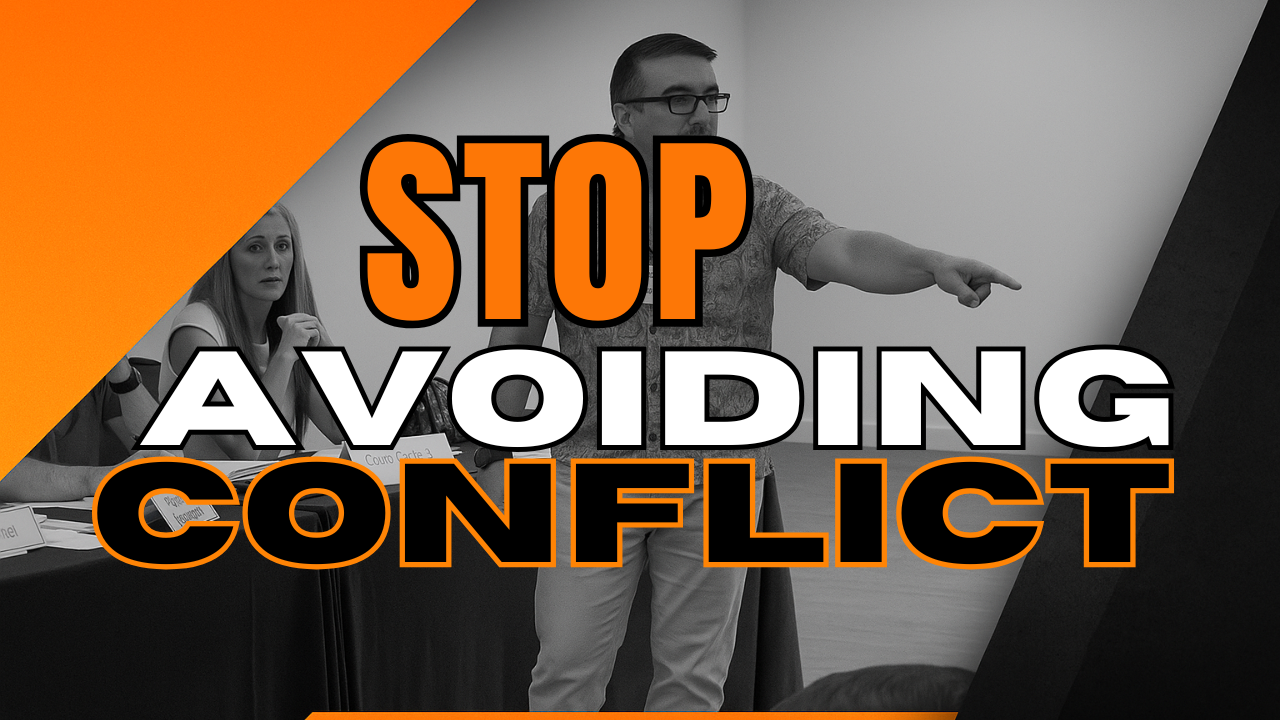How Construction Professionals can Master Difficult Conversations: Stop Avoiding Conflict
Sep 24, 2025
Why do we avoid conflict in the first place?
Let’s be real: most professionals would rather put in extra hours, bend over backwards, or quietly stew in frustration than confront someone head-on. Why? Because conflict feels messy. It feels risky. And if you’re already stretched thin at work, the last thing you want is another firestorm. But here’s the gritty truth: avoiding tough conversations doesn’t solve problems. It multiplies them.
As Jordan Peterson put it, “Conflict avoided is conflict multiplied.” If you’re a leader or even just someone who wants to show up strong in your role dodging hard conversations is like letting termites chew through the foundation of your house. Eventually, it collapses.
So how do you stop ducking these moments and step into them with courage? Let’s break it down.
What really makes conversations “difficult”?
It’s tempting to blame the other person. “If they weren’t so stubborn…” “If they’d just do their job…” But here’s the catch: you’re part of the equation too. As my buddy Sean Moran put it on a recent call, you’re always at least one percent of the problem. That means you also hold one percent (or more) of the solution.
Hard conversations feel difficult because:
-
We fear the fallout. What if they get angry? What if it damages the relationship? What if it backfires on my career?
-
We wait too long. Instead of addressing the issue early, we stew. We let it build until we’re ready to explode.
-
We confuse honesty with meanness. Telling the truth doesn’t have to equal being cruel—but many of us never learned the skill of balancing both.
The truth? These conversations are only as difficult as the stories we build in our heads before we actually have them.
How do you know when to step in?
One simple filter: Is this something they can control or change? If yes, it’s worth addressing. If not like someone’s acne or their taste in spouses it’s wasted energy.
In professional settings, though, if the issue affects performance, safety, or culture, it’s your job to bring it up. Leaders don’t get to outsource discomfort. The cost of silence is higher than the cost of a five-minute awkward chat.
What are the cheat codes for handling conflict?
If your stomach knots up at the thought of confrontation, try these:
1. Shrink the time gap.
Don’t wait. The longer you sit on a problem, the bigger it grows in your head. Address it early, before it festers.
2. Focus on facts, not feelings.
Instead of “You’re lazy,” say, “You missed the 7 a.m. start time three days this week.” Facts strip away defensiveness.
3. Expect pushback and don’t take it personally.
Rebuttals aren’t attacks; they’re people reconciling your feedback with their version of reality. Let them process. Don’t turn it into a duel.
4. Lead with responsibility.
Own your slice of the problem. Saying, “I could’ve brought this up sooner,” shows maturity and lowers defenses.
5. Run toward the danger.
It’s counterintuitive, but leaning into discomfort calmly, directly short-circuits the cycle of avoidance. As one leader put it: hard conversations are the cost of growth.
How do you balance honesty with kindness?
Here’s the kicker: honesty itself is kindness. Dressing up the truth in soft pillows only sets people up for bigger failures later. The key isn’t to dilute your message it’s to deliver it without venom.
Ask yourself:
-
Is what I’m saying true?
-
Is it something they can act on?
-
Am I saying it in a way that helps them get better, not just feel smaller?
If the answer is yes, then you’re not being mean you’re being a leader.
What happens if you keep avoiding conflict?
Imagine being a foreman who lets someone show up late for weeks without saying anything. By the time you explode, you’ve lost credibility, poisoned trust, and boxed yourself into a corner. The same applies in offices and boardrooms: small issues become landmines when left unchecked.
Avoidance isn’t protection it’s sabotage.
The final word: Stop avoiding, start leading.
You became a professional to make an impact, not to babysit dysfunction. That impact requires guts. Hard conversations aren’t roadblocks they’re the bridge to trust, accountability, and real growth.
So the next time you feel that knot in your stomach, remind yourself: avoiding it only makes it worse. Step in. Be clear. Be kind. And own your part of the solution.
Because at the end of the day, the professionals who grow, lead, and leave a legacy aren’t the ones who sidestep conflict they’re the ones who Do the Damn Thing.
Watch & Learn More
Want to see this conversation unfold live? Check out the full livestream here: What to Do About Difficult Conversations.
And if you’re ready to stop running from conflict and take back control of your time, energy, and leadership? Join me in the Self First Time Mastery Webinar because you don’t need more hours. You need a better system. It’s time to Do the Damn Thing.
